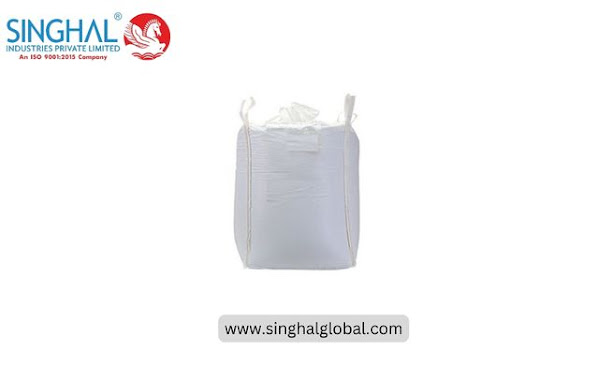Eco-Friendly Solutions: The Sustainable Edge of FIBC Bulk Bags
In today’s industrial landscape, efficiency and sustainability are paramount. As businesses strive to streamline their operations while minimizing their environmental impact, the demand for innovative packaging solutions continues to rise. Flexible Intermediate Bulk Containers (FIBC), commonly known as bulk container bags, have emerged as a versatile and eco-friendly option for transporting and storing a wide range of materials, from grains and powders to chemicals and minerals. In this blog post, we will delve into the world of FIBC bulk bags, exploring their benefits, applications, and the key factors to consider when choosing a manufacturer. Additionally, we will address some frequently asked questions to provide a comprehensive understanding of this essential packaging solution.
What Are FIBC Bulk Container Bags?
FIBC bulk container bags, are large, flexible containers designed for the transport and storage of bulk materials. Typically made from woven polypropylene (PP) fabric, these bags offer high tensile strength and durability while remaining lightweight and cost-effective. FIBC bulk bags come in various sizes and configurations to suit different applications, ranging from standard one-ton bags to custom designs with specialized features such as liners, baffles, and discharge spouts.
Benefits of FIBC Bulk Bags
- Cost-Effective Transportation: FIBC bulk bags can significantly reduce transportation costs compared to traditional rigid containers such as drums or boxes. Their lightweight construction means they contribute less to the overall weight of the shipment, leading to lower freight charges. Additionally, their collapsible design allows for efficient storage when empty, further optimizing logistics.
- Space Efficiency: One of the primary advantages of FIBC bulk bags is their space-saving design. Unlike rigid containers, which require ample storage space even when empty, bulk bags can be folded or stacked compactly, maximizing warehouse efficiency. This feature is especially beneficial for businesses with limited storage capacity.
- Environmental Sustainability: As concerns about environmental sustainability continue to grow, FIBC bulk bags offer a compelling solution. Unlike single-use packaging materials such as cardboard boxes or wooden crates, FIBC bulk bags are reusable and recyclable, reducing waste and minimizing carbon footprint. By choosing FIBC bulk bags, companies can align with their sustainability goals while maintaining operational efficiency.
- Versatility and Customization: FIBC bulk bags are incredibly versatile and can be tailored to meet specific application requirements. Whether you need breathable bags for agricultural products, conductive bags for hazardous materials, or static-resistant bags for sensitive electronics, there’s a customized solution available. Manufacturers can incorporate various features and accessories to ensure optimal performance in diverse environments.
Applications of FIBC Bulk Bags
The adaptability of FIBC bulk bag manufacturers makes them suitable for a wide range of industries and applications, including:
- Agriculture: Transporting grains, seeds, and fertilizers.
- Chemicals: Handling powders, granules, and hazardous materials.
- Construction: Storing sand, gravel, and construction debris.
- Food and Pharmaceuticals: Packaging bulk ingredients and raw materials.
- Mining: Transporting ores, minerals, and aggregates.
- Recycling: Collecting and transporting recyclable materials.
Choosing the Right FIBC Bulk Bag Manufacturer
When selecting a manufacturer for FIBC bulk bags, several factors should be considered to ensure quality, reliability, and compliance with industry standards:
- Experience and Reputation: Look for manufacturers with a proven track record and positive reputation in the industry. A company with extensive experience in FIBC production is more likely to deliver high-quality products and excellent customer service.
- Quality Control Measures: Inquire about the manufacturer’s quality control processes and certifications. Reputable manufacturers adhere to strict quality standards and conduct thorough testing to ensure the durability and integrity of their FIBC bulk bags.
- Customization Capabilities: Assess the manufacturer’s ability to customize FIBC bulk bags according to your specific requirements. Whether you need specialized features, custom sizes, or branding options, choose a manufacturer that can accommodate your needs.
- Compliance and Certification: Ensure that the manufacturer complies with relevant industry regulations and standards, such as ISO 21898 for FIBC design and construction. Additionally, certifications from organizations like the Flexible Intermediate Bulk Container Association (FIBCA) signify adherence to best practices and quality assurance.
Conclusion
In conclusion, FIBC bulk bags near me offer a compelling combination of efficiency, versatility, and sustainability for businesses across various industries. By partnering with a reputable manufacturer and understanding the key considerations involved, companies can leverage FIBC bulk bags to optimize their supply chain operations while reducing their environmental footprint. Whether you’re transporting agricultural products, chemicals, or construction materials, FIBC bulk bags provide a cost-effective and eco-friendly solution for your packaging needs.
Frequently Asked Questions (FAQs)
- Are FIBC bulk bags reusable?
- Yes, FIBC bulk bags are designed for multiple uses, making them a sustainable packaging option. After emptying the contents, the bags can be cleaned, inspected, and reused for subsequent shipments or storage.
- What is the weight capacity of FIBC bulk bags?
- FIBC bulk bags come in various weight capacities, ranging from a few hundred kilograms to several tons. The specific weight capacity depends on factors such as bag size, fabric strength, and safety factor requirements.
- Can FIBC bulk bags be recycled?
- Yes, FIBC bulk bags are typically made from recyclable materials such as polypropylene (PP). Once they reach the end of their service life, they can be recycled through specialized programs or facilities to create new products or materials.
- Are FIBC bulk bags suitable for hazardous materials?
- Yes, FIBC bulk bags can be manufactured to meet the requirements for transporting and storing hazardous materials safely. These bags are constructed with specialized features such as liners, barrier coatings, and static protection to prevent leaks, contamination, and electrostatic discharge.



.png)
Comments
Post a Comment